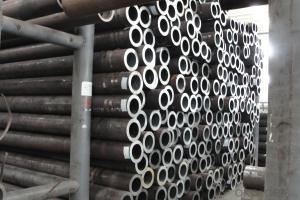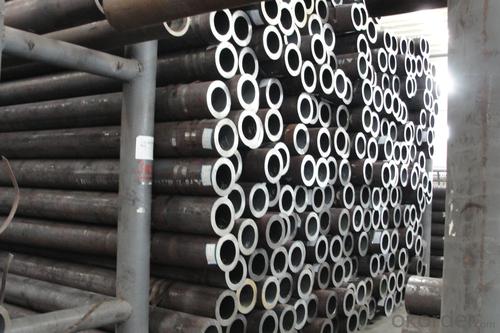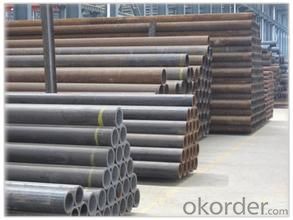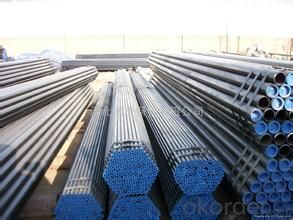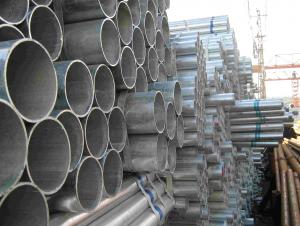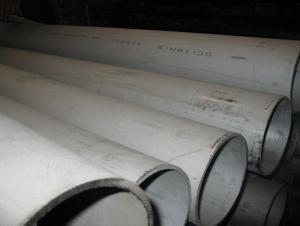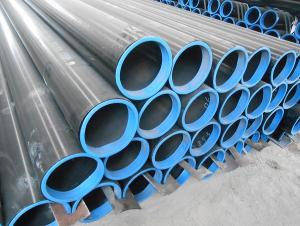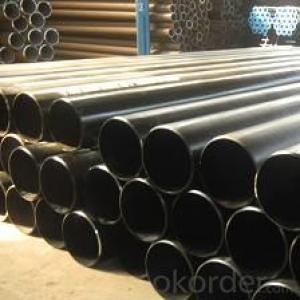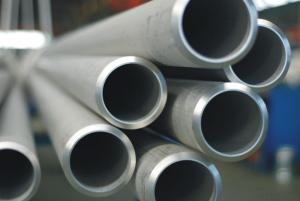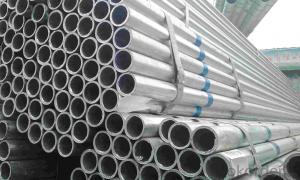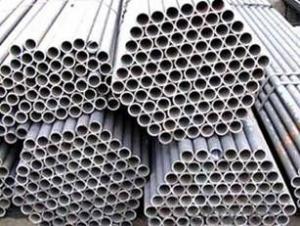Seamless Pipe Raw Pipe
- Loading Port:
- China Main Port
- Payment Terms:
- TT or LC
- Min Order Qty:
- -
- Supply Capability:
- -
OKorder Service Pledge
OKorder Financial Service
You Might Also Like
1、Structure of Seamless Pipe :
Seamless pipe was regarded as withstanding pressure better than other types, and was often more easily available than welded pipe.
2、Main Features of the Seamless Pipe :
• High manufacturing accuracy
• High strength
• Small inertia resistance
• Strong heat dissipation ability
• Good visual effect
• Reasonable price
3、Seamless Pipe Specification:
Standard | GB, DIN, ASTM ASTM A106-2006, ASTM A53-2007 |
Grade | 10#-45#, 16Mn 10#, 20#, 45#, 16Mn |
Thickness | 8 - 33 mm |
Section Shape | Round |
Outer Diameter | 133 - 219 mm |
Place of Origin | Shandong, China (Mainland) |
Secondary Or Not | Non-secondary |
Application | Hydraulic Pipe |
Technique | Cold Drawn |
Certification | API |
Surface Treatment | factory state or painted black |
Special Pipe | API Pipe |
Alloy Or Not | Non-alloy |
Length | 5-12M |
Outer Diameter | 21.3-610mm |
Grade | 20#, 45#, Q345, API J55, API K55, API L80, API N80, API P110, A53B |
Standard | ASME, ASTM |
1) Material:20#(ASTM A 106/A53 GRB.API5LGRB,GB),45#,16Mn,10#.
2) Specification range:OD:21.3-610mm,WT:6-70mm,length:6-12m or according to the requirement of clients.
3) Excutive standards:GB,ASME API5L.ASTM A 106/A53,Despite of the above standards,we can also supply seamless steel pipe with standard of DIN,JIS,and so on,and also develop new products according to the requirements of our clients!
4) Packing:bundles wrapped with strong steel strip,seaworthy packing.
4、Packaging & Delivery
Packaging Details: | seaworthy package,bundles wrapped with strong steel strip |
Delivery Detail: | 15-30days after received 30%TT |
5、FAQ of Seamless Pipe :
①How is the quality of your products?
Our products are manufactured strictly according to national and internaional standard, and we take a test on every pipe before delivered out. If you want see our quality certifications and all kinds of testing report, please just ask us for it.
②How about price?
We are able to give you lowest price below market one, and we have a policy that “ for saving time and absolutely honest business attitude, we quote as lowest as possible for any customer, and discount can be given according to quantity”.Please trust the quotation we would give you, it is professional one.
③Why should you chose us?
Chose happens because of quality, then price, We can give you both.Additionally, we can also offer professional products inquiry, products knowledge train(for agents), smooth goods delivery, exellent customer solution proposals.Our service formula: good quality+good price+good service=customer’s trust
SGS test is available, customer inspection before shipping is welcome, third party inspection is no problem.
Any question, pls feel free to contact us !
6、Seamless Pipe Images:
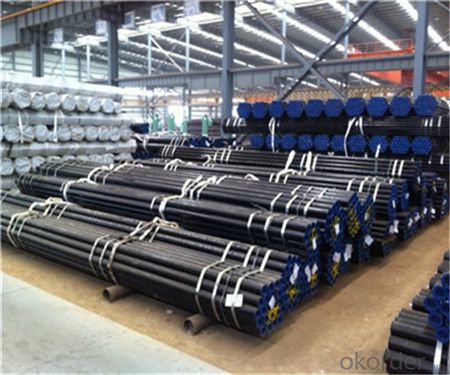
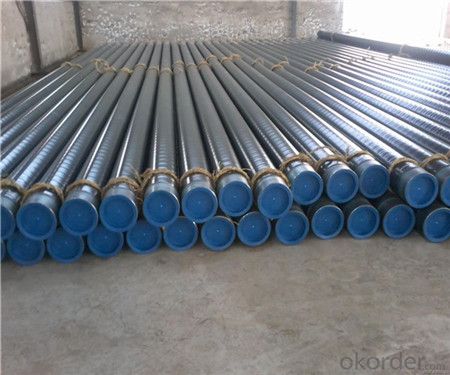
- Q: What is the purpose of a steel pipe coating?
- The purpose of a steel pipe coating is to provide protection to the pipe from corrosion and other environmental factors that can lead to deterioration. Coating the pipe with a layer of material helps to create a barrier between the steel and the surrounding environment, preventing direct contact and reducing the risk of corrosion. This is especially important for pipes that are used in industries such as oil and gas, water distribution, and construction, where they are exposed to harsh conditions such as moisture, chemicals, and extreme temperatures. The coating also helps to enhance the durability and longevity of the pipe, ensuring that it can withstand the demands of its intended application. Additionally, certain types of pipe coatings can also provide insulation properties, preventing heat loss or transfer in applications where temperature control is critical. Overall, the purpose of a steel pipe coating is to protect the pipe, extend its lifespan, and ensure its optimal performance in various industries and environments.
- Q: What is the difference between steel pipes and PVC pipes?
- The main difference between steel pipes and PVC pipes lies in their material composition. Steel pipes are made of a durable and strong metal alloy, while PVC pipes are made of a lightweight and flexible plastic called polyvinyl chloride. Steel pipes are typically used for heavy-duty applications that require high strength and resistance to extreme temperatures and pressure, such as in industrial settings or for transporting liquids or gases over long distances. On the other hand, PVC pipes are commonly used for residential and commercial plumbing systems due to their affordability, ease of installation, and resistance to corrosion. Additionally, PVC pipes are not suitable for high-pressure applications and have a lower heat tolerance compared to steel pipes.
- Q: How are steel pipes used in the manufacturing of HVAC systems?
- Steel pipes are commonly used in the manufacturing of HVAC systems for various purposes. They are used to transport fluids, such as water or refrigerants, throughout the system. Steel pipes are also used for exhaust systems and ventilation, providing a durable and corrosion-resistant solution. Additionally, steel pipes are used in the construction of HVAC equipment, such as heat exchangers and boilers, due to their strength and ability to withstand high temperatures and pressures. Overall, steel pipes play a crucial role in the efficient and reliable functioning of HVAC systems.
- Q: Can steel pipes be used for underground stormwater systems?
- Yes, steel pipes can be used for underground stormwater systems. Steel pipes are durable and resistant to corrosion, making them a suitable choice for underground applications. Additionally, steel pipes can handle high volumes of stormwater, making them ideal for stormwater management systems.
- Q: Are steel pipes suitable for underground industrial waste disposal?
- Due to their durability and strength, steel pipes find frequent use in underground industrial waste disposal. Their ability to withstand harsh underground conditions, such as moisture, pressure, and corrosion, is noteworthy. Furthermore, steel pipes exhibit resistance to chemical reactions, making them well-suited for managing diverse types of industrial waste. In this manner, they can effectively transport and confine hazardous materials, thereby guaranteeing the safety and safeguarding of the environment and its surroundings. Overall, steel pipes are widely acknowledged as a dependable and effective choice for underground industrial waste disposal.
- Q: Can steel pipes be used in extremely cold temperatures?
- Yes, steel pipes can be used in extremely cold temperatures. Steel is known for its strength and durability, making it suitable for various applications, including in extreme cold weather conditions. Steel pipes have a high resistance to low temperatures and can withstand the effects of freezing temperatures without losing their structural integrity. This makes them ideal for use in industries such as oil and gas, where they are exposed to sub-zero temperatures. Additionally, steel pipes can be insulated or coated to provide further protection against the cold and prevent any potential issues, such as freezing or cracking. Overall, steel pipes are a reliable choice for use in extremely cold temperatures.
- Q: How do you clean and maintain steel pipes?
- To clean and maintain steel pipes, start by removing any loose dirt or debris using a brush or cloth. Then, use a mild detergent or soap solution to wash the pipes thoroughly. Rinse them with clean water and dry them with a soft cloth to prevent water spots. To maintain them, regularly inspect for signs of corrosion or rust and address any issues promptly. Additionally, apply a protective coating or paint to prevent future rusting.
- Q: What are the different methods of pipe support for steel pipes?
- Various methods exist for supporting steel pipes, each aimed at guaranteeing pipe stability, alignment, and protection. Some frequently employed techniques are as follows: 1. Pipe Hangers: These devices suspend or bear the weight of the pipe from above. Typically crafted from metal, they can be adjustable or fixed, allowing for easy installation and maintenance. Depending on the application, pipe hangers can take the form of clevis hangers, beam clamps, or pipe rollers. 2. Pipe Shoes: These supports attach directly to the underside of the pipe, providing a stable resting surface. Usually made from steel or other durable materials, pipe shoes prevent pipe movement, absorb vibrations, and distribute weight evenly. They find common use in applications involving high temperatures or requiring thermal expansion. 3. Pipe Clamps: These devices fasten pipes together or secure them to structures. Constructed primarily of metal, pipe clamps come in various sizes and designs to accommodate different pipe diameters and configurations. They provide support and prevent sagging or movement, particularly in areas with directional or elevation changes. 4. Pipe Racks: These structures are custom-designed to support multiple pipes in an organized and secure manner. Commonly found in industrial settings like refineries or power plants, pipe racks store or support large quantities of pipes. Typically made of steel, they can be tailored to suit different pipe sizes and layouts. 5. Pipe Guides: These devices facilitate pipe movement control, especially during thermal expansion or contraction. Fixed to the structure, pipe guides offer a sliding surface that accommodates longitudinal pipe movement. They are frequently utilized in applications involving temperature variations, such as steam or hot water systems. These represent just a few examples of the numerous methods available for supporting steel pipes. The choice of support method depends on factors such as pipe size, weight, temperature, and specific application requirements. Selecting the appropriate support method is crucial to ensure pipe longevity and integrity while preventing issues like sagging, misalignment, or failure.
- Q: What place must use galvanized steel pipe to make lighting line?
- Galvanized steel is widely used in construction, machinery, coal, chemical industry, railway vehicles, automobile industry, highway, bridge, container, sports facilities, agricultural machinery, petroleum machinery, prospecting machinery and other manufacturing industries.
- Q: Can steel pipes be used for underground water wells?
- Indeed, underground water wells can utilize steel pipes. The selection of steel pipes is frequently based on their robustness and resilience, rendering them apt for enduring the exerted force and load of the encompassing soil and water. They are extensively employed in residential and industrial settings for the purpose of drilling and constructing water wells. Nevertheless, it is crucial to take into account specific factors including the steel's type and quality, along with the existence of corrosive components in the water, in order to ensure the durability and dependability of the well system. Moreover, adequate insulation and coating might prove necessary to avert corrosion and contamination of the subterranean water source.
Send your message to us
Seamless Pipe Raw Pipe
- Loading Port:
- China Main Port
- Payment Terms:
- TT or LC
- Min Order Qty:
- -
- Supply Capability:
- -
OKorder Service Pledge
OKorder Financial Service
Similar products
Hot products
Hot Searches
Related keywords
